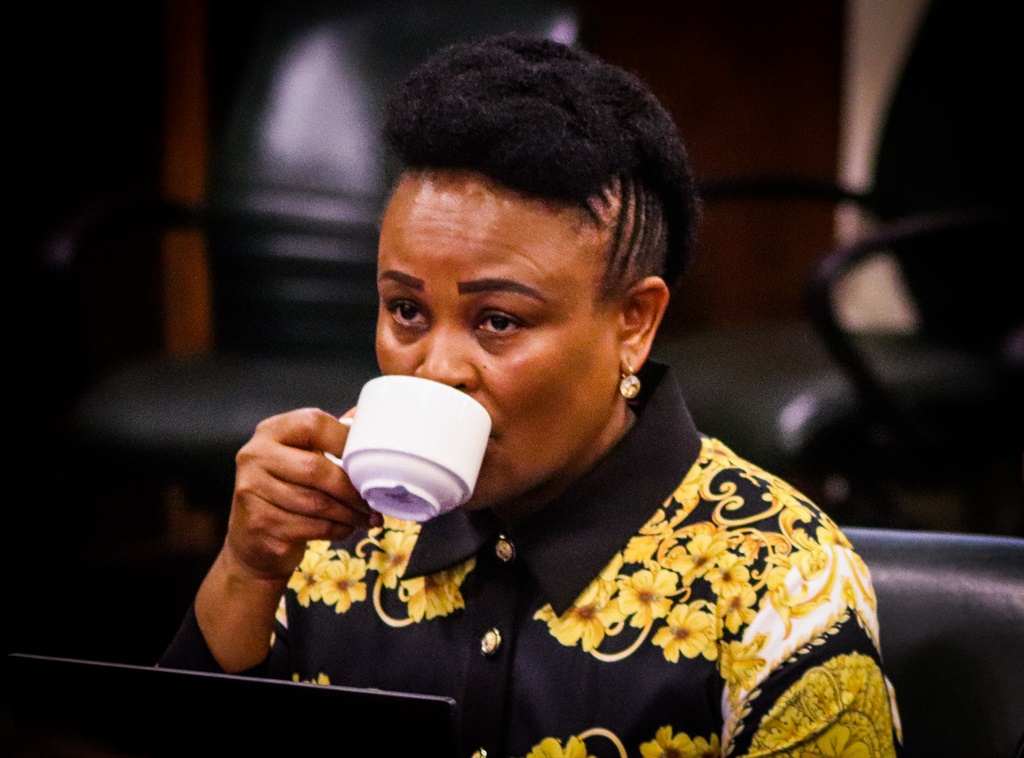


Public Protector Busisiwe Mkhwebane at a parliamentary meeting in October 2019.
- Public Protector Busisiwe Mkhwebane’s application to halt proceedings to remove her will be heard on Wednesday.
- It was supposed to be heard in March, but then the Covid-19 pandemic struck.
- Speaker of the National Assembly Thandi Modise opposed the application “in defence of Parliament’s powers”.
Public Protector Busisiwe Mkhwebane’s challenge to the parliamentary process to “dethrone” her will finally be heard in court on Wednesday after it was put on the backburner when Covid-19 struck.
The court battle began in February after Mkhwebane filed an urgent bid in the Western Cape High Court, seeking an interdict to halt the parliamentary process to remove her from office.
The interdict was only the first part of the application.
She was also asking the court to set aside the rules for the removal of Chapter 9 Institution heads, such as the Public Protector, which the National Assembly adopted in December, and rule it unconstitutional and invalid.
This followed National Assembly Speaker Thandi Modise’s approval of the DA’s substantive motion to institute removal proceedings against Mkhwebane, which came three days after the National Assembly adopted the rules.
DA chief whip Natasha Mazzone withdrew the motion and submitted another, with 7 000 pages of what the DA deems as further evidence that Mkhwebane should be removed.
Again, Modise approved the motion.
Mkhwebane then brought her application.
“It is the very first time ever in our young democracy that a serious attempt is being made to remove and dethrone the head of a watchdog institution by impeachment,” her founding affidavit read.
ALSO READ | Gordhan v Mkhwebane: Public Protector claims had good reason to probe SARS unit’s equipment use
Modise opposed the application “in defence of Parliament’s powers as provided for in the Constitution which states that these institutions are accountable to the National Assembly”, Parliament’s spokesperson Moloto Mothapo said at the time.
In her answering affidavit, Modise asked the court to throw out Mkhwebane’s application as there was no basis to stop the process and the National Assembly was within its rights to pursue the case.
As in her founding affidavit, Mkhwebane was scathing of Modise in her responding papers, saying that “the speaker has most ominously adopted the attitude and posture of an interested adversary in this matter”.
“That is unbefitting of her constitutional role. The main adversary is supposed to be the DA.”
Mkhwebane stated all she “really desires is legal certainty and judicial assurance” that the rules for her removal were constitutionally valid.
She also wanted the DA’s answering affidavit struck for being “scandalous, vexatious, hearsay, argumentative, and, where applicable, irrelevant in parts”.
What she wants to be struck from the DA’s affidavit is a statement by Sphelo Samuel, the head of the Office of the Public Protector in the Free State, in which he accuses Mkhwebane of mismanagement and other misconduct, including her handling of the politically sensitive Vrede Dairy Farm investigation.
In papers, Mkhwebane described Samuel as a “disgraced and disgruntled” employee, facing disciplinary steps after he was found guilty of assault.
Mkhwebane’s matter was provisionally set down for 26 and 27 March – but, as the country entered lockdown, the parties agreed to postpone it to a later date.
When Parliament returned from recess in late April, its focus was on dealing with the pandemic, and the removal proceedings were put on the backburner.
Wednesday’s proceedings would be conducted virtually, and Thursday has also been set aside for it.
In June, Modise announced that she was in the process of appointing the three-person panel, who would determine whether there was a prima facie case for Mkhwebane’s removal.
However, there hadn’t been any further movement since.
On Monday, DA spokesperson Glynnis Breytenbach requested the Portfolio Committee on Justice receive an urgent update from Modise on the process.

